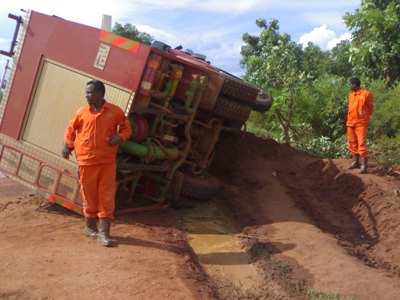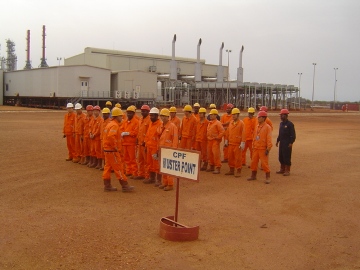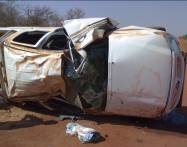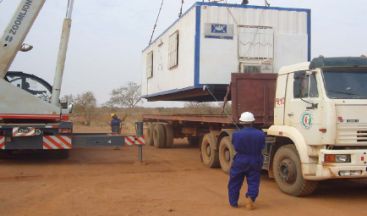Safety lapses shown to be chronic at Chinese oil venture in Sudan
By Daniel Van Oudenaren
February 16, 2010 (WASHINGTON) – PetroEnergy E&P, a Chinese-owned oil and gas operating company in Sudan, has stacked up a record of low safety standards and deadly accidents by the company personnel and its contractors, according to internal documents and communications obtained by Sudan Tribune, dating from 2007 to 2010.
 PetroEnergy operates Sudan’s Block 6 oil concession, the only oil concession entirely in North Sudan, situated mainly in Kordofan and stretching into southern Darfur. The venture is 95 percent owned by China National Petroleum Corporation (CNPC).
PetroEnergy operates Sudan’s Block 6 oil concession, the only oil concession entirely in North Sudan, situated mainly in Kordofan and stretching into southern Darfur. The venture is 95 percent owned by China National Petroleum Corporation (CNPC).
In a presentation prepared for a December 2009 meeting of contractors, Khalid Faroug Ahmed, acting superintendent for Health, Safety and Environment (HSE) at Baleela Base Camp, reported 24 safety accidents throughout the year including three fatal ones. Of those, twelve were traffic accidents, five were fires, one was an oil spill, one was a gunshot incident, four were occupational incidents, and one occurred when a dozer fell from a lowbed trailer.
“Speed is still a major cause of accidents in the field and is considered to directly contribute to up to 65% of fatalities each year,” said the December presentation.
Since the beginning of the year 2010 already there were nine reported accidents – none deadly but five of which were assessed as “serious,” including two traffic roll-overs.
Management for years now have been receiving reports of traffic accidents. In a report by Mr. Faroug dated December 16, 2007, a pickup truck driving at 60 km/h blew a front tire and turned off the road. One of the passengers, a shadow drilling supervisor, was not wearing his seatbelt and fractured his right arm. The next month, January 2008, patrol units along the pipeline had an accident in which four were injured, two “very seriously” according to a note written by an employee. The two injured men were taken to Hegleig for a flight to Khartoum.
 Other accidents involved lack of adequate training. On the morning of June 9, 2007, a Sudanese staff member of Petroneed Company was cleaning with rags and gasoline as part of his normal duties on the second floor of an oil treatment facility. A flash fire resulted burning both his forearms and face. Personnel put out the fire out and took the worker to the PetroEnergy medical clinic in Baleela Base Camp.
Other accidents involved lack of adequate training. On the morning of June 9, 2007, a Sudanese staff member of Petroneed Company was cleaning with rags and gasoline as part of his normal duties on the second floor of an oil treatment facility. A flash fire resulted burning both his forearms and face. Personnel put out the fire out and took the worker to the PetroEnergy medical clinic in Baleela Base Camp.
STRAINED LOCAL RELATIONS
Some internal communications suggest tense or even violent relations with local people. In October 2007, several children tried to stop a company vehicle and broke a windshield with a stone when it did not halt. The next month, one fired Sudanese employee struck a rig manager on the head, rupturing the manager’s eardrum.
In a more serious exchange, a field production manager reported in a 2007 e-mail to President Chen Shudong, then-Vice President Azhari Abdulla and others, that the road between Muglad and Hegleig was not safe, “mainly due to local people demanding for compensation” at a particular village. He also cited an incident in the area of Diffa in which armed robbers were scattered into the bush after a confrontation with armed security forces. Company leaders including Mr. Shudong followed up on this information with messages discussing their coordination with national security to resolve the situation on the roads.

Last month, a vehicle belonging to a PetroEnergy subcontractor killed or injured 10 to 14 sheep. The speeding lorry failed to brake for the herd on a dust-obscured road. The subcontractor, who was reluctant to report the incident, “solved” the matter that afternoon together with the owner of the sheep and local policemen from Jake village.
A safety manager also expressed concern that employees hired from the local community did not receive adequate training, resulting in “lost time” accidents. At a presentation to employees the manager reportedly said a locally hired cook had cut his finger February 9 “due to not being competent.” Staff of the China Petroleum Engineering and Construction Company likewise reported that the worker was using improper tools and recommended immediate action to prevent local employees from engaging in such work.
PetroEnergy engages in some community projects in Block 6. It has established experimental farms in Um Galoha village, Fula and Al Muglad, according to the company’s website. The company says it also established a hospital, two schools, a mosque, a health center and basic school, dozens of potable wells and two ambulances.
MANAGEMENT MEASURES
Employees have attended local safety training sessions, set up road signs, drilled for medical evacuations and taken other precautions. But even so, PetroEnergy’s senior management have allegedly been reluctant to provide adequate resources to address the problems. When it was suggested that some junior Sudanese personnel go for safety training in the United Kingdom, management declined saying it would be too expensive.
Lendy Araujo, former HSE Superintendent, designed a technical evaluation to help improve safety. The performance index was meant as a way to statistically evaluate certain safety performance indicators. “With this register, the company is able to keep appropriate records concerning exposure and control the health of personnel… comply with legal requirements and safeguard the company interests against [unjustified indemnification],” said the document. In an interview, Araujo confirmed that he was responsible for designing the performance index and added that the reporting measure was rejected by management.

Mr. Araujo in an email message was highly critical of PetroEnergy’s safety standards and implementation. He said that a proactive approach to safety at any company like PetroEnergy should be set to “limit human suffering and damage to equipment as well as the environment.”
“Here is where PetroEnergy fails in protecting the people by avoiding the appropriate application of these proactive approaches causing suffering to the people assigned to it within its operations — as far as I know this is a real fact in Baleela Operations in Kordofan,” he said.
(ST)
